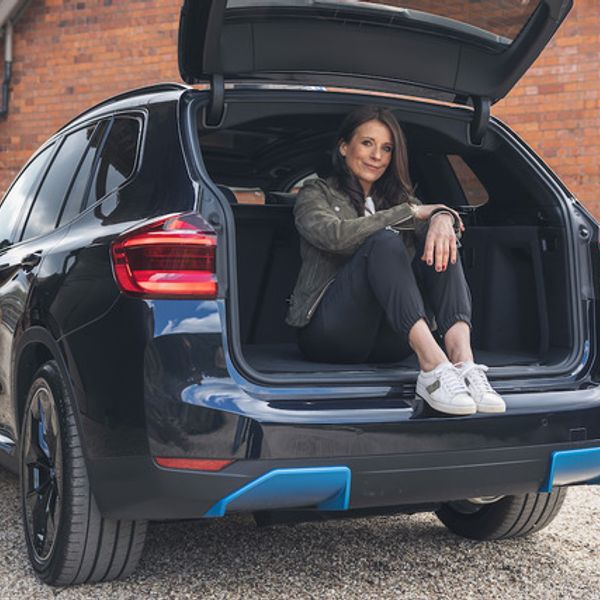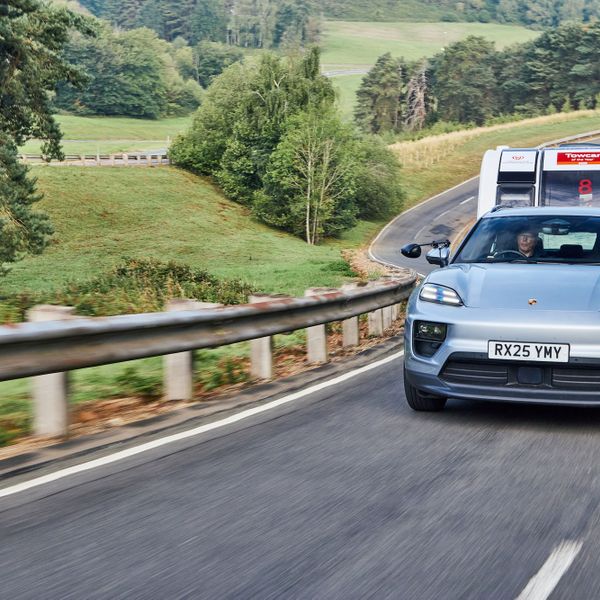For drivers making the switch to electric car ownership, having a home charger makes a huge amount of sense.
It’s not an option for everyone but if you’ve got off-street parking, the initial cost of having a wallbox installed will be worth it in the long run.
Firstly, it is far more convenient than having to seek out nearby public chargers and means your car can be fully topped up every morning. It’s cheaper too. Even a regular home electricity tariff will be cheaper than a public rate, and with dedicated EV rates available, a home charger could save you hundreds of pounds a year in charging costs.
And it’s safer than using a three-pin plug since a dedicated charger has built-in protection to make sure nothing overheats or gets damp.
You can read our comprehensive guides to home charging and full reviews here but, here’s our rundown of the best home chargers on sale in 2024.
Price from: N/A
BP has stopped selling its home wall boxes directly to customers, instead focusing on sales to large fleets. That means you can’t buy one privately but you might still be offered one if you lease an electric car, either privately or as a company car.
If you are a company car driver, the charger’s accompanying app can do some quite clever things to help you track and claim back charging for business mileage, although we found it to be occasionally glitchy. It can also remotely monitor and schedule charging to take advantage of off-peak tariffs.
Alongside that, the BP Pulse home charger is set up to support vehicle-to-home and vehicle-to-grid bi-directional changing, when that eventually comes on stream.
![]() The BP Pulse is only available to fleet buyers, so you can't buy direct
The BP Pulse is only available to fleet buyers, so you can't buy direct 7. Hypervolt
Price from: £630 plus installation
The Hypervolt is among the most feature-rich home chargers out there, in physical and technical terms.
It comes in a choice of colours and if you can’t mount it on your wall, you can buy a bespoke mounting post to position the charger somewhere more convenient. You can also specify how long a cable you need - 5m, 7.5m or 10m. Just be aware that all versions are tethered - that means the cable is permanently attached. Hypervolt will even sell you a Type 1 plug to fit early Japanese cars like the first-generation Nissan Leaf.
But it’s also a smart device with an intelligent power management system to balance the energy use between home and vehicle. It’s also compatible with solar panels and features scheduled timing, although it doesn’t currently integrate with more advanced EV tariffs like Octopus Ihttps://www.electrifying.com/charging/home-charger/solar/hypervoltntelligent Go or OVO Anytime.
![]() The big flashing lightning bolt will certainly get the neighbours' attention
The big flashing lightning bolt will certainly get the neighbours' attention Price from: £659 plus installation
The Easee One has a pared-back Scandinavian style to it but, unusually, can be customised with five different coloured faceplates to suit your surroundings, car or even mood.
There are no controls on the unit, instead, everything is managed by an app. This allows for scheduled charging but doesn’t currently work with advanced EV-specific tariffs. It does, however, allow you to hook up to solar power with the use of some extra hardware. Access to the charger can be controlled with RFID ‘keys’, which could be useful if multiple people/vehicles use the charger or it’s located in a shared car park.
The unit is untethered (sold without a cable) so you’ll need to buy a cable separately but you can then use the app to lock the lead to the charger semi-permanently.
![]() You can choose between five different colour faces to make the Easee more interesting to look at
You can choose between five different colour faces to make the Easee more interesting to look at Price: £779 plus installation
The myenergi Zappi is a great choice for any household that wants to integrate their electric car charging with renewable energy generation. The charger and app can hook up seamlessly with home solar panels and battery storage as well as other myenergi devices, allowing owners to charge their vehicle at the lowest possible cost.
Design-wise, it’s not the most stylish of things but it’s inoffensive enough and, unlike a lot of chargers, features a handy on-unit display and controls to manage charging if you don’t have immediate access to the app. The app, however, gives you a broader range of controls for monitoring and managing you charging.
![]() The Zappi can connect seamlessly to battery storage and solar systems
The Zappi can connect seamlessly to battery storage and solar systems Price from: £1,199 plus installation
The Andersen A2 is possibly the best-looking home wall box on the market and comes with a bewildering array of customisation options for the style-conscious driver. There are 126 different colour and material combinations to choose from, including wood and carbon fibre.
Adding to the aesthetic appeal, the tethered cable - available in 5.5m or 8.5m lengths - is completely hidden once it’s wrapped around the unit, with a neat magnetic lid to keep the plug clean.
There are no on-device controls, just one LED indicator. Everything is managed via the app that allows to to schedule charging, view the cost of individual charges and lock the unit remotely.
As you’d expect, the designer finish comes at a price, with the basic unit starting at £1,199 and fancy facias adding to that.
![]() Chargers don't come any more stylish than the Andersen
Chargers don't come any more stylish than the Andersen Price: £449 plus installation
Rolec’s Wallpod is the cheapest home charging unit we could find that’s compatible with all of the current regulations. That makes it attractive to house builders who are legally obliged to fit chargers but also to homeowners looking for a budget-friendly home charger.
Despite its relatively low price, the QUBEV Smart is an impressive device with a dedicated app for scheduling off-peak charging and a ‘green’ option to make the most of solar power if you’ve got it.
Entry-price devices don’t have a cable but you can pay a little extra for a tethered version with a 5m lead. Unusually, Rolece will also sell you a standalone mounting post if you want to position the device somewhere other than on your wall.
![]() The Rolec may be cheap, but it has great technology
The Rolec may be cheap, but it has great technology Price: £563 plus installation
One of the big appeals of the Ohme Home Pro is that it is - at time of writing - the only device compatible with Octopus Energy’s super-cheap Intelligent Octopus Go tariff, which offers the UK’s lowest overnight charging rate.
It’s also an attractive and surprisingly small device that still manages to pack plenty of key information and controls into its LCD screen. As you’d expect, there’s also a user-friendly app for monitoring and managing your charging and making sure you get the most out of those cheap off-peak rates.
There are two versions on sale - the Pro, which has a tethered cable and the LCD screen, and the ePod, which comes without a cable or screen and is £50 cheaper.
![Ohme electric car home charger with a Nissan Leaf]() The Ohme is the 'favoured' charger for many fleets and car brands
The Ohme is the 'favoured' charger for many fleets and car brands Price: £675 plus installation
The British-built Evios One is our favourite home charger thanks to its unbeatable array of smart features that mean it works with renewable energy, cheap tariffs and even for multiple users.
Depending on your home energy setup and charging needs, the Evios One can work with solar panels to use the sun to charge your car, or prioritise charging at off-peak times to keep costs down (it’s not compatible with Octopus Intelligent Go, however). Or, you can ask it to simply charge your car as quickly as possible. That’s aided by One’s ability to accept a 22kW feed at sites with three-phase power, such as business premises.
Also handy for business locations or anywhere else the device is shared by multiple users is the ability to create up to eight user profiles, each with their own PIN.
There is a large display screen showing speed, miles added and cost information on the unit but functions are controlled via an intuitive app. If even that’s too much work, the One is compatible with Amazon Alexa and Google Home devices, so you can change settings and review charging with just the power of your voice.
![]() The One offers PIN opertation, so you can divvy up charge costs between users
The One offers PIN opertation, so you can divvy up charge costs between users 


















